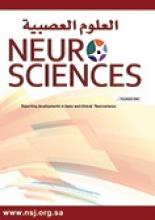Abstract
OBJECTIVE: Autism is a neurodevelopmental disorder with unknown etiology. The etiology of autism is complex, and the underlying pathologic mechanisms are unknown. This study tests the autoimmune mechanisms in the pathogenesis for autism in autistic children in the Riyadh area.
METHODS: The study took place in the Riyadh area of the Kingdom of Saudi Arabia between September 2003 and April 2004. Sixty-five autistic children, with a confirmed diagnosis according to E-2 diagnostic criteria for autistic spectrum disorders, participated in the study. Serological examination of antibodies to measles, mumps, rubella (MMR), and myelin basic protein (MBP) was carried out in autistic and control children.
RESULTS: The level of MBP antibodies was significantly higher in autistic children as compared to controls (p<0.01). Furthermore, the level of antibodies to measles but not mumps or rubella was significantly higher in autistics compared to the control group (p<0.05). Moreover, 82% of autistic sera positive for measles IgG was also positive for MBP.
CONCLUSION: The current study supports the hypothesis that autoimmunity plays a role in the pathogenesis of autism. However, results from the current study are not enough to support that immunization by MMR is playing a role in the autoimmune process in autistism.
- Copyright: © Neurosciences
Neurosciences is an Open Access journal and articles published are distributed under the terms of the Creative Commons Attribution-NonCommercial License (CC BY-NC). Readers may copy, distribute, and display the work for non-commercial purposes with the proper citation of the original work.






